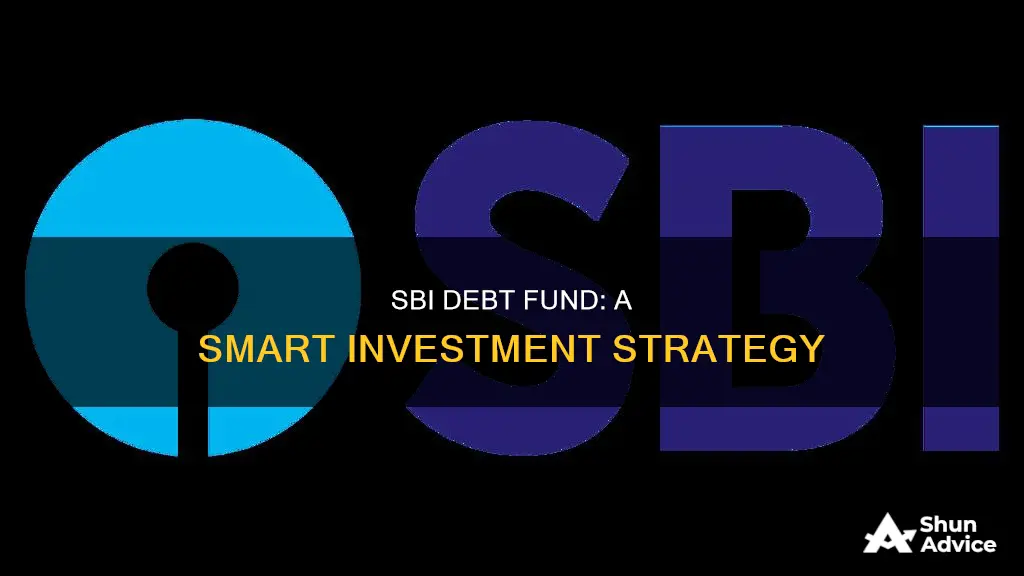
SBI debt funds are ideal for conservative investors with a 5-year investment horizon. They invest in debt and money market instruments, providing regular income and capital safety. SBI debt funds are considered relatively stable and less risky than equity funds. They are also more tax-efficient for long-term investors in higher tax brackets. However, they generally offer lower returns than more aggressive investment tools. SBI debt funds carry low to moderately high market risk, and their performance may vary from one period to another. Before investing, it is important to understand the tax implications, expense ratios, interest rate sensitivity, credit risk, and assets under management.
| Characteristics | Values |
|---|---|
| Investment Objective | To provide investors with regular income and safety of capital over the short to medium term |
| Investment Type | Debt and money market instruments |
| Ideal Investor Type | Conservative investors with a 5-year investment horizon |
| Risk Level | Low to moderately high market risk |
| Returns | Historically, 7-10% over 5 years |
| Tax | Short-term capital gains tax depends on the investor's income tax slab rate. Long-term capital gains tax is 20% |
| Number of Schemes | 22 |
| Example Schemes | SBI Magnum Gilt Fund, SBI Dynamic Bond Fund, SBI Credit Risk Fund, SBI Magnum Income Fund, SBI Magnum Medium Duration Fund, SBI Short Term Debt Fund |
What You'll Learn

How to invest in SBI debt funds online
SBI Mutual Fund is a joint venture between the State Bank of India and Amundi, a French asset management company. It offers various mutual fund schemes across equity, debt, hybrid, and other categories.
There are several ways to invest in SBI Mutual Funds online, each with its own set of requirements and steps:
Through the SBI Mutual Fund Website:
To invest through the official website, you will need to register and create an account if you don't already have one. Once you log in, you can browse the various SBI Mutual Fund schemes and select one that aligns with your goals and risk appetite. However, managing your investments this way can be cumbersome, especially if you invest across multiple mutual fund houses.
Through a Distributor:
Investing through a distributor can simplify the application process. However, it will result in a higher expense ratio as fund houses pay commissions to distributors, ultimately impacting your overall returns.
Through Investment Platforms:
Using investment platforms like Groww and ET Money is a simpler, more efficient, and effective way to invest in SBI Mutual Funds online. Here's an outline of the process using these platforms:
Groww:
- Log in to your Groww account, or register and create a new one.
- Upload your identification documents, such as Aadhaar, PAN, Voter ID, Passport, Driving License, or any ID issued by the Central or State government.
- Upload proof of address.
- Determine the duration and risk amount (high, low, or medium) of your investment.
- Select the best SBI Mutual Fund scheme based on your criteria.
- Choose to invest a lumpsum amount or start a Systematic Investment Plan (SIP).
ET Money:
- Sign up using your email and OTP.
- Select the fund, enter the investment amount, and choose the investment type (lumpsum or SIP).
- Enter your PAN, full name, and verify your mobile number.
- Provide bank account details and select a payment mode. If choosing SIP, set up a mandate.
- Follow the Know Your Client (KYC) process, which includes submitting photos of your identity and address proofs, a selfie, and a live video.
- Provide essential details and eSign.
- The transaction will be processed upon verification of your KYC documents.
Additional Information:
- Minimum Investment Amount: The minimum lumpsum investment amount for most SBI Debt Funds is ₹5,000, while the minimum for SIP is typically ₹500.
- Documents for KYC: In addition to the PAN card, which is mandatory, other valid identity documents include any ID issued by the Central or State government, a bank account statement or passbook, and utility bills.
Please note that the information provided is based on the sources available and may not be exhaustive. It's always recommended to refer to official sources and consult financial advisors before making investment decisions.
Galaxy Digital Assets Fund: An Investment Guide
You may want to see also

SBI debt funds: pros and cons
SBI debt funds are ideal for conservative investors who are seeking capital appreciation and regular income over a period of around 5 years. Here are some pros and cons of investing in SBI debt funds:
Pros:
- Stable returns: Debt funds invest in various fixed-income instruments, lowering the associated risk for investors and providing stable returns.
- Flexibility: Debt funds offer more flexibility than other investment tools.
- High liquidity: Debt funds are highly liquid, making them suitable for investors seeking high liquidity.
- Regular income: SBI debt funds provide investors with regular income through interest income and a steady increase in fund value.
- Safety of capital: These funds provide safety of capital over the short to medium term.
- Tax efficiency: Long-term capital gains from debt funds are taxed at a rate of 20% and receive the benefit of indexation, making them tax-efficient for investors in higher tax brackets.
Cons:
- Lower returns: Debt funds generally offer lower returns compared to more aggressive investment tools, such as equity funds.
- Market risk: SBI debt funds carry low to moderately high market risk, and the fund value may fluctuate with changes in the price of underlying debt securities.
- Interest rate risk: The price of debt securities and, consequently, the performance of debt funds are influenced by interest rate movements.
- Credit risk: The credit risk of portfolio constituents varies, and high-risk portfolios carry a higher potential for default.
Index Funds in Sweden: A Guide to Getting Started
You may want to see also

SBI debt funds: tax implications
SBI debt funds are suitable for conservative investors who are seeking capital appreciation and regular income over a period of around 5 years. These funds are considered safer than equity funds as they invest in fixed-income securities like treasury bills, corporate bonds, government securities, and money market instruments. These investments generally offer a fixed rate of return and are not tightly linked to stock market movements.
When it comes to tax implications, it's important to understand that it's not the fund itself that is taxable or tax-free, but rather the gains you earn from your investment. In India, capital gains tax is levied on your investment returns, and the rate depends on the type of fund and the duration of your investment.
If you hold a debt fund for less than 3 years, it is considered a short-term investment, and the tax is calculated according to your income tax bracket. For example, if you fall into the 20% tax bracket and earn a return of Rs. 10,000 on a debt fund investment, you will pay 20% of that amount as tax, which comes out to Rs. 2,000.
On the other hand, if you hold a debt fund for more than 3 years, it is considered a long-term investment, and any interest earned is taxed as long-term capital gains. The applicable tax rate in this case is 20% with indexation plus a 3% cess, which comes out to 20.90%. So, if you earn Rs. 10,000 in interest on a long-term debt fund investment, you will pay Rs. 2,090 in tax.
It's worth noting that long-term debt funds take inflation into account when calculating returns, whereas fixed deposits are taxed based on the total interest income. As a result, debt funds may offer higher overall returns than fixed deposits, even though the latter often provide higher interest rates. Additionally, investors in higher tax brackets (20-30%) can benefit more from tax-efficient debt funds than those in lower brackets.
Lumpsum Mutual Fund Investment: Timing for Maximum Returns
You may want to see also

SBI debt funds: risk factors
SBI debt funds are considered less volatile than equity funds, but they do carry a higher risk than fixed deposits and similar fixed-income products. Here are some of the risk factors associated with SBI debt funds:
Interest Rate Risk
SBI debt funds are subject to interest rate risk. When interest rates rise, bond prices tend to fall, which can negatively impact the fund's performance. The fund managers actively monitor economic conditions and interest rate movements to make informed investment decisions.
Credit Risk
Credit risk is another factor to consider. SBI debt funds invest in fixed-income earning debt instruments, including corporate bonds. The SBI Credit Risk Fund, for example, invests in corporate bonds rated AA and below, excluding AA+ rated bonds. Lower-rated bonds have a higher risk of default, and investors should be aware of this risk.
Liquidity Risk
Debt funds are also subject to liquidity risk, which is the risk of not being able to sell an investment quickly enough at a fair price. This risk is usually higher for longer-term debt funds.
Market Risk
All mutual funds, including SBI debt funds, are subject to market risk. Past performance is not a guarantee of future results, and investors should be aware that they could lose money. It is always recommended to consult a financial advisor before making any investment decisions.
Capital Gains Tax
While not a risk in the traditional sense, it is important to consider the tax implications of investing in SBI debt funds. As per the Finance Bill 2023, debt mutual funds will no longer have the long-term capital gains (LTCG) benefit. Capital gains arising from investments made after April 1, 2023, will be taxed according to the investor's income tax slab rate.
Key Considerations for Investing in Algorithmic Trading Funds
You may want to see also

SBI debt funds: investment options
SBI debt funds are ideal for conservative investors with an investment horizon of around five years. They aim to provide regular income and safety of capital by investing in debt and money market instruments.
SBI offers 10+ debt fund schemes, including short- and long-term options. These include:
- SBI Magnum Gilt Fund Direct-Growth
- SBI Dynamic Bond Direct Plan-Growth
- SBI Credit Risk Fund Direct-Growth
- SBI Magnum Income Direct Plan-Growth
- SBI Magnum Medium Duration Fund Direct-Growth
- SBI Savings Fund Direct-Growth
- SBI Magnum Low Duration Fund Direct Plan-Growth
- SBI Magnum Ultra Short Duration Fund Direct-Growth
- SBI Liquid Fund Direct Plan-Growth
- SBI Short Term Debt Fund Direct-Growth
Before investing, it is important to understand the tax implications of SBI debt funds. Debt funds are subject to two types of taxation, depending on their holding period:
- Short-term capital gains tax: For debt funds held for less than three years, taxes are calculated based on the investor's income tax bracket.
- Long-term capital gains tax: Debt funds redeemed after three years of investment are taxed at a rate of 20%.
Additionally, investors should consider factors such as the expense ratio, duration, interest rate regime, credit risk, and assets under management when deciding to invest in SBI debt funds.
Investing in Mutual Funds for Minors: A Step-by-Step Guide
You may want to see also
Frequently asked questions
SBI debt funds are a type of mutual fund that invests in debt and money market instruments, such as treasury bills, government securities, and other fixed-income generating securities. They provide investors with regular income and safety of capital.
There are a few ways to invest in SBI debt funds. You can either invest through the official SBI Mutual Fund website, through a distributor, or through an online investment platform such as Groww or ET Money. When investing through the SBI Mutual Fund website, you will need to register for an account and select the appropriate debt fund scheme based on your goals and risk appetite.
SBI MF debt funds carry low to moderately high market risk compared to equity funds. The value of the fund may fluctuate as the price of the underlying debt security changes. Factors such as interest rates, government policies, tax laws, and economic developments can influence the price of debt securities.
Advantages of investing in SBI debt funds include stable returns, more flexibility, and high liquidity. They also provide lower associated risks for investors compared to more aggressive investment tools. However, a disadvantage is that debt funds generally offer lower returns than their equity counterparts.







